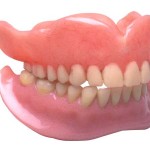It is common to feel weird or uncomfortable with new dentures in your mouth especially for those who never had any dentures before. Your dentist might extend the denture base so that the newly fabricated denture will be more retentive . You will feel uncomfortable even though it might be a small change compared to your old denture. Certain amount of perseverance is needed as it takes time for you to get used to your new dentures.
Do not be overwhelmed if you have excess saliva in your mouth. It is certainly normal as new objects stimulates the production of saliva and swallowing the excess saliva is recommended . Spitting of excess saliva might cause denture instability. Your speech might be affected at first when you just had your new dentures. This is because our tongue might not be used to the new denture and even a small changes at the inner border of anterior teeth can cause speech difficulty, To reduce speech difficulty, you can practice by reading out loud at home.
Normally after getting newly done dentures, patients will be overwhelmed as they will be looking forward to consume food that they couldn’t eat before. But bear in mind that you should develop eating skills slowly as eating with dentures might not be easy. You might need around 6-8 weeks to learn how to chew using your dentures. New memory patterns must be established for the facial muscles and muscles that we use to masticate. First , you can try to eat/consume simple and soft food to start your training. You can divide your food into half, and place on both sides. Chewing bilaterally can balance the forces and prevent tipping of dentures.
Maintenance of denture is an important aspect that you should know after getting your new dentures. You should provide adequate rest for your denture bearing surfaces by removing your dentures at night to reduce stress on your oral tissues. Irritation or inflammation of tissues might occur due to prolonged hours of denture wearing. After removing your dentures at night, you can place in water to prevent dimensional and occlusal changes.
One of the factors to prolong the life span of a denture is to maintain the hygiene of your denture. You can rinse your mouth after every meals to prevent food debris stuck on the denture . You can brush your denture with soft toothbrush. Avoid brushing too hard as it might abrade the denture. There are a lot of denture cleansers available at the market. Denture cleansers can be used by soaking the denture for at least 30 minute to kill microorganisms and to remove stain. You can also make your own denture cleansing agent ,etc: 1 tablespoon of sodium hypochlorite ( bleaching agent),1 tablespoon of Calgon(water softener) to loosen deposits.  To remove calculus on denture, you can soak in 4 ounces of vinegar. Sonic cleaner works by vibration which is another alternative to remove calculus. Another important factor is to maintain your oral tissues hygiene by cleaning tongue and rinsing after meals.
It is important to keep your new dentures on especially during the initial periods although it might be uncomfortable to you so that your tissues can get used to it. You need to consult your dentist if you face severe discomfort with your denture so that slight adjustments can be done.
